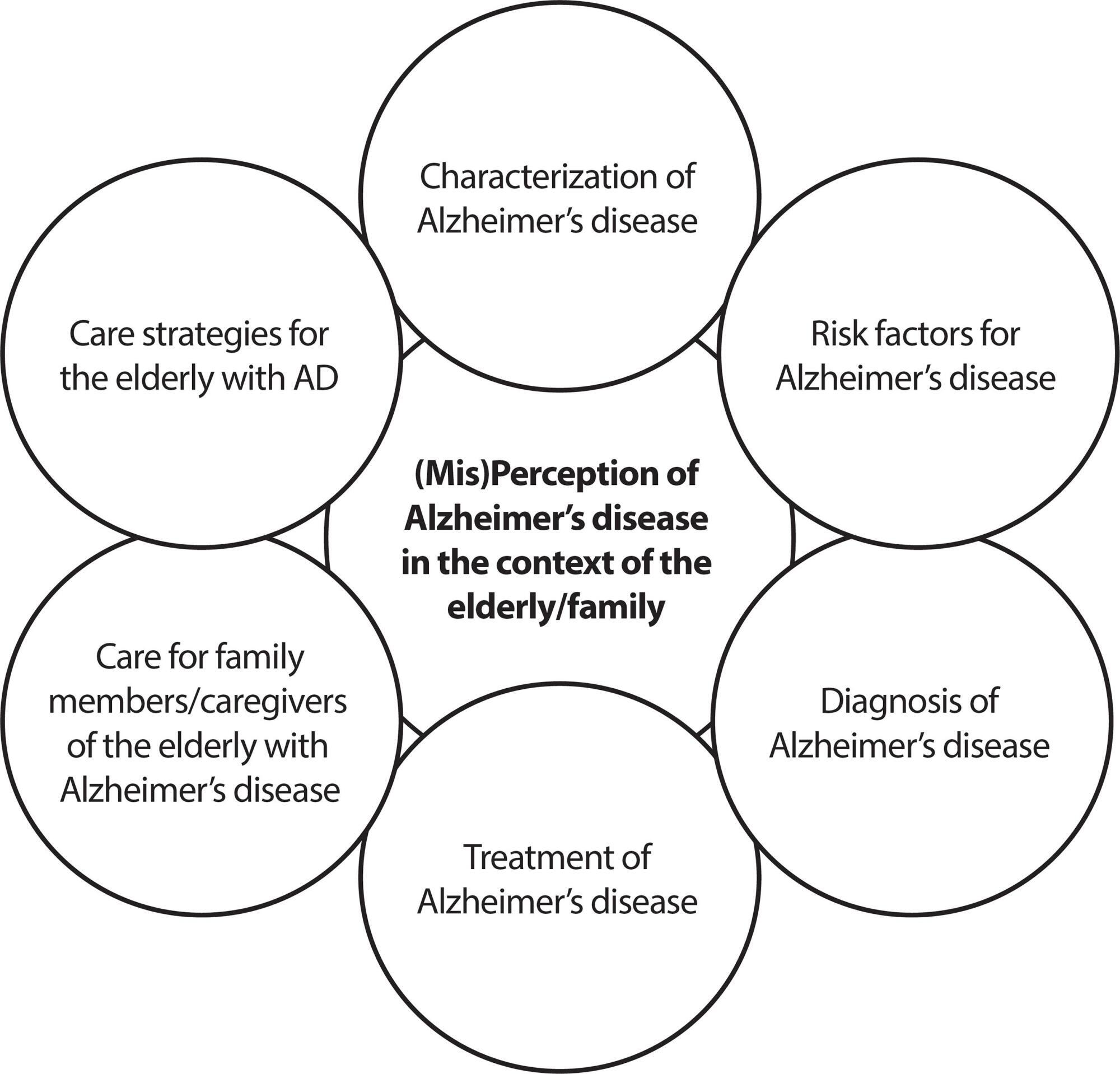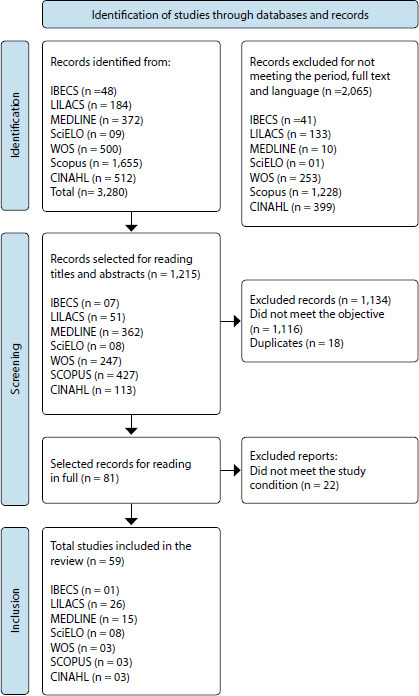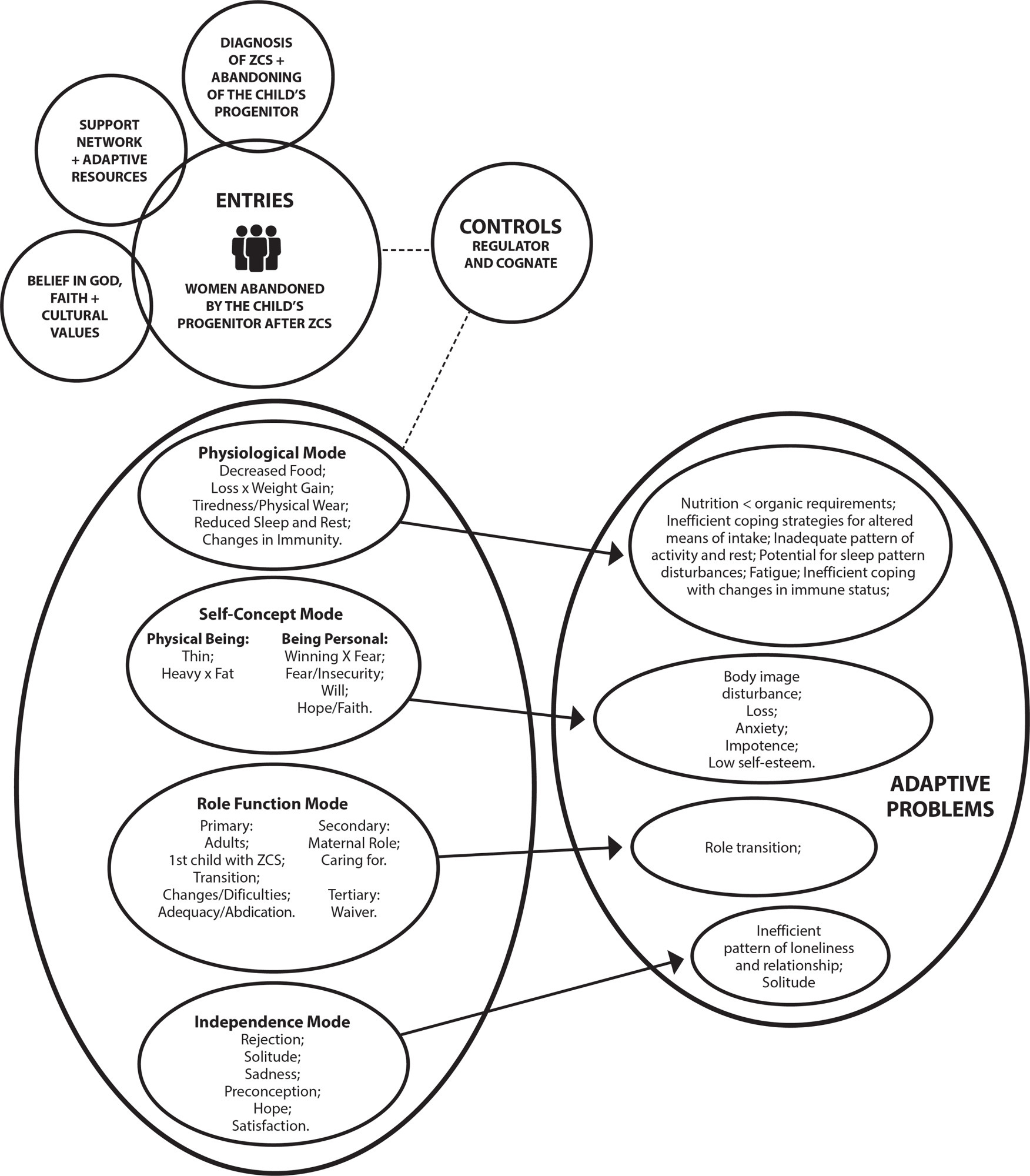-
ORIGINAL ARTICLE12-16-2024
A relação entre gênero, formação educacional e ambiente de aprendizagem com a ansiedade do estudante de enfermagem
Revista Brasileira de Enfermagem. 2024;77(6):e20220615
Abstract
ORIGINAL ARTICLEA relação entre gênero, formação educacional e ambiente de aprendizagem com a ansiedade do estudante de enfermagem
Revista Brasileira de Enfermagem. 2024;77(6):e20220615
DOI 10.1590/0034-7167-2022-0615
Views0See moreRESUMEN
Objetivos:
identificar las variables asociadas a la práctica clínica relacionadas con la ansiedad de los estudiantes de enfermería.
Métodos:
se utilizó un diseño descriptivo, cuantitativo, correlacional con las recomendaciones STROBE, EQUATOR. La población fue de 233 estudiantes de enfermería con una muestra de 135 personas. Los datos se recopilaron de marzo a abril de 2022 utilizando instrumentos validados.
Resultados:
la prueba de chi-cuadrado y razón de verosimilitud significativa para género, formación académica y entorno de aprendizaje son superiores a 0.05, por lo que no existe una relación significativa entre las variables y la ansiedad de los estudiantes.
Conclusiones:
los estudiantes necesitan prepararse nuevamente antes de ingresar al campo de la práctica. Investigaciones cualitativas también son necesarias.
-
ORIGINAL ARTICLE12-16-2024
Software for the care of people with cardiovascular risk: construction and evidence of validity
Revista Brasileira de Enfermagem. 2024;77(6):e20240276
Abstract
ORIGINAL ARTICLESoftware for the care of people with cardiovascular risk: construction and evidence of validity
Revista Brasileira de Enfermagem. 2024;77(6):e20240276
DOI 10.1590/0034-7167-2024-0276
Views0See moreABSTRACT
Objectives:
to build and validate software for the care of people with cardiovascular risk.
Methods:
a methodological study, applied to software development, anchored in a nursing theory and classification system, in three stages: 1) requirements engineering; 2) software architecture and coding; and 3) testing and content validity by 12 experts in computer science, with a Content Validity Ratio score.
Results:
called e-TEORISC, in software format, for nursing care for people with cardiovascular risk, online and offline, containing a database linked to the Nursing Process stages. Experts considered that the attributes of functional suitability, performance efficiency, reliability, maintainability, usability, safety and portability obtained desirable scores.
Conclusions:
e-TEORISC has evidence of validity to instrumentalize care for people at cardiovascular risk, with potential for technology transfer to the Brazilian Health System.

-
ORIGINAL ARTICLE12-16-2024
Sleep quality of patients with heart failure and associated factors
Revista Brasileira de Enfermagem. 2024;77(6):e20240244
Abstract
ORIGINAL ARTICLESleep quality of patients with heart failure and associated factors
Revista Brasileira de Enfermagem. 2024;77(6):e20240244
DOI 10.1590/0034-7167-2024-0244
Views0See moreABSTRACT
Objectives:
to assess sleep quality of patients with heart failure and associated sociodemographic and clinical characteristics.
Methods:
a cross-sectional study, developed with 88 patients. Sleep quality was assessed by the Pittsburgh Sleep Quality Index. The data were analyzed using descriptive and inferential statistics.
Results:
the mean sleep quality score was 8.59 ± 3.60 points. 83% of participants were classified as poor sleepers. The number of hours of sleep was 5.99 ± 1.48. Family income of up to one minimum wage and functional class were significantly associated with poor sleepers. There was a positive correlation between functional class and poor sleep quality.
Conclusions:
a high frequency of poor sleepers was identified. Worse scores were associated with family income and symptomatic functional class. Health interventions are necessary to control sleep quality, especially in relation to health functionality.
-
ORIGINAL ARTICLE12-16-2024
Religion and professional experience: Are they predictors of nurses’ spiritual intelligence? Cross-sectional study
Revista Brasileira de Enfermagem. 2024;77(6):e20240217
Abstract
ORIGINAL ARTICLEReligion and professional experience: Are they predictors of nurses’ spiritual intelligence? Cross-sectional study
Revista Brasileira de Enfermagem. 2024;77(6):e20240217
DOI 10.1590/0034-7167-2024-0217
Views0See moreABSTRACT
Objectives:
to analyze the relationship between religion and professional experience with spiritual intelligence in nurses
Methods:
cross-sectional and analytical study carried out in 2021, with the participation of 544 nursing professionals working in health facilities in Peru during the COVID-19 pandemic. Multiple regression analysis and Pearson’s correlation were used to analyze the data.
Results:
in nurses, a healthy level of spiritual intelligence predominated (42.8%). Those who did not profess a religion were more likely to have a lower spiritual intelligence score (global scale and dimensions); however, experienced nurses were more likely to have higher spiritual intelligence (global scale and dimensions) than novice nurses (p<0.05).
Conclusions:
spiritual intelligence in nurses was predicted by religion and professional experience. This finding suggests that spiritual intelligence in nursing is consolidated through religious practices and during professional practice.
-
ORIGINAL ARTICLE12-16-2024
Effectiveness of the modified Seldinger technique for peripheral central catheter in newborns: a randomized clinical trial
Revista Brasileira de Enfermagem. 2024;77(6):e20240189
Abstract
ORIGINAL ARTICLEEffectiveness of the modified Seldinger technique for peripheral central catheter in newborns: a randomized clinical trial
Revista Brasileira de Enfermagem. 2024;77(6):e20240189
DOI 10.1590/0034-7167-2024-0189
Views0ABSTRACT
Objectives:
to evaluate the effectiveness of peripheral central catheterization by comparing the modified Seldinger technique and the conventional technique in critically ill newborns.
Methods:
randomized unmasked clinical trial conducted in a public children’s hospital. Participation of 111 newborns with randomized allocation, 56 in the control group (conventional technique) and 55 in the experimental group (modified Seldinger). Success and absence of complications were evaluated as primary outcomes. The pain scale, difficulty in hemostasis, procedure time and number of punctures were considered secondary outcomes.
Results:
there was no statistical significance between groups, either for success (p=0.705) or absence of complications (p=0.347). A lower pain score, improved hemostasis, increased assertiveness with fewer punctures and reduced procedure time were not observed in the experimental group.
Conclusions:
the modified Seldinger technique did not prove to be a more effective insertion technology compared to the conventional method. Brazilian Clinical Trial Registry: RBR-69vks36.
Keywords:Comparative Effectiveness ResearchNewbornPeripheral CatheterizationRandomized Controlled TrialTechnologySee more
-
ORIGINAL ARTICLE12-16-2024
Psychometric analysis of ProQOL-BR in nursing: building hospital safety and protection
Revista Brasileira de Enfermagem. 2024;77(6):e20240085
Abstract
ORIGINAL ARTICLEPsychometric analysis of ProQOL-BR in nursing: building hospital safety and protection
Revista Brasileira de Enfermagem. 2024;77(6):e20240085
DOI 10.1590/0034-7167-2024-0085
Views0ABSTRACT
Objectives:
to analyze the psychometric properties of the ProQOL-BR instrument in hospital nursing professionals.
Methods:
a methodological study to validate the ProQOL-BR. Confirmatory factor analysis, assessment of local and global adjustment quality, Pearson hypothesis testing and Cronbach’s alpha internal consistency analysis were used.
Results:
a total of 490 professionals participated. The model presents adequate quality due to factor weights (λ≥ 0.40), acceptable overall fit quality and adequate chi-square ratio and degrees of freedom (χ2/g.1=2.51) for the parameters of CFI (0.923), GFI (0.902), TLI (0.914) and RMSEA (0.042). In terms of validity, it was shown to be adequate with CC=0.89. The internal consistency obtained by standardized Cronbach’s alpha was 0.761. Criterion validity was shown to be favorable with significant correlations (0.001).
Conclusions:
the instrument was validated regarding content, criteria and reliability. Three questions were removed from the original instrument, ProQOL-BR, leaving the final instrument with 25 questions.
Keywords:BurnoutHealth Status IndicatorsNursing StaffQuality of Professional LifeValidation Studies as TopicSee more
-
ORIGINAL ARTICLE12-16-2024
Health literacy development of Primary Health Care patients: qualitative research
Revista Brasileira de Enfermagem. 2024;77(6):e20240154
Abstract
ORIGINAL ARTICLEHealth literacy development of Primary Health Care patients: qualitative research
Revista Brasileira de Enfermagem. 2024;77(6):e20240154
DOI 10.1590/0034-7167-2024-0154
Views0ABSTRACT
Objectives:
to identify the process of health literacy development among primary care patients, relating it to their self-care practices.
Methods:
qualitative, prospective research with 22 patients from two Family Health Strategy units. Data were obtained through individual semi-structured interviews, examined through descriptive statistics and thematic content analysis.
Results:
the results discuss how participants learn about health and how this resonates in their behaviors, culminating in two thematic categories: “Health knowledge construction”; and “Dialogue between health knowledge construction and patient care actions”.
Final Considerations:
health knowledge is developed mainly through interpersonal relationships, mediated by health professionals through bonding and communication. Community educational actions and training of health professionals in communication can promote health literacy and self-care among patients.
Keywords:Chronic DiseaseHealth LiteracyPrimary Health CareQualitative ResearchWorld Health OrganizationSee more
-
ORIGINAL ARTICLE12-16-2024
Religión y experiencia profesional: ¿Serán predictores de la inteligencia espiritual de los enfermeros? Estudio transversal
Revista Brasileira de Enfermagem. 2024;77(6):e20240217
Abstract
ORIGINAL ARTICLEReligión y experiencia profesional: ¿Serán predictores de la inteligencia espiritual de los enfermeros? Estudio transversal
Revista Brasileira de Enfermagem. 2024;77(6):e20240217
DOI 10.1590/0034-7167-2024-0217es
Views0See moreRESUMEN
Objetivos:
analizar la relación entre religión y experiencia profesional con la inteligencia espiritual en enfermeros.
Métodos:
estudio transversal y analítico realizado en 2021, participaron 544 profesionales de enfermería que laboraban en establecimiento de salud de Perú durante la pandemia por COVID-19. Para el análisis de los datos se emplearon el análisis de regresión múltiple y correlación de Pearson.
Resultados:
en los enfermeros predominó un nivel de inteligencia espiritual saludable (42,8%). Quienes no profesaban una religión tenían mayor probabilidad de tener menor puntaje de inteligencia espiritual (escala global y dimensiones); sin embargo, los enfermeros expertos tuvieron mayor probabilidad de tener mayor inteligencia espiritual (escala global y dimensiones) que los enfermeros novatos (p<0,05).
Conclusiones:
la inteligencia espiritual en los enfermeros fue predicha por la religión y la experiencia profesional. Este hallazgo sugiere que la inteligencia espiritual en enfermería se consolida mediante prácticas religiosas y durante el ejercicio profesional.
-
ORIGINAL ARTICLE07-13-2020
Awareness raising workshop for nursing students on the elderly with Alzheimer’s disease: contributions to education
Revista Brasileira de Enfermagem. 2020;73:e20190021
Abstract
ORIGINAL ARTICLEAwareness raising workshop for nursing students on the elderly with Alzheimer’s disease: contributions to education
Revista Brasileira de Enfermagem. 2020;73:e20190021
DOI 10.1590/0034-7167-2019-0021
Views0See moreABSTRACT
Objective:
To describe the contribution of an awareness-raising workshop for nursing students on Alzheimer’s disease in the context of the elderly/family.
Methods:
Strategic action-research developed with 15 university students from the sixth to the eighth semester of Nursing at a university institution in the Rio Grande do Sul. The data collected through semi-structured interviews, before and after an awareness-raising workshop on Alzheimer’s disease in elderly/family, were subjected to thematic content analysis.
Results:
Six categories were identified that concern (Mis) perception of Alzheimer’s disease in the context of elderly/ family, from the characterization; risk factors; diagnosis; treatment of Alzheimer’s disease; from care to family members/caregivers; and care strategies for the elderly with Alzheimer’s disease.
Conclusion:
The awareness-raising workshop enabled the students to broaden and deepen the knowledge on the theme of Alzheimer’s disease in the elderly.

-
ORIGINAL ARTICLE09-23-2022
Analysis of the concept of cardiovascular risk: contributions to nursing practice
Revista Brasileira de Enfermagem. 2022;75(4):e20210803
Abstract
ORIGINAL ARTICLEAnalysis of the concept of cardiovascular risk: contributions to nursing practice
Revista Brasileira de Enfermagem. 2022;75(4):e20210803
DOI 10.1590/0034-7167-2021-0803
Views0See moreABSTRACT
Objectives:
to analyze the concept of cardiovascular risk to support nursing practice.
Methods:
this is an analysis to define the concept of cardiovascular risk, through the use of eight steps of Walker’s and Avant’s framework, using a literature review in indexed scientific journals.
Results:
cardiovascular risk is defined in a broad and original way as a context of health and nursing care that makes it possible to identify modifiable (cardiometabolic, behavioral, psychosocial, cultural and occupational) and non-modifiable (biological) risk factors for cardiovascular diseases that act as early and interrelated markers, of multiple and heterogeneous etiology, predisposing to cardiovascular vulnerability.
Conclusions:
with the analysis and definition of the concept of cardiovascular risk, we realized that it will be possible to base nursing practice, with implications in clinical practice for identifying and reducing risk factors for cardiovascular diseases, with nursing relevance in the care of these subjects.

-
REFLECTION11-11-2020
Children with special needs in health: challenges of the single health system in the 21st century
Revista Brasileira de Enfermagem. 2020;73:e20190037
Abstract
REFLECTIONChildren with special needs in health: challenges of the single health system in the 21st century
Revista Brasileira de Enfermagem. 2020;73:e20190037
DOI 10.1590/0034-7167-2019-0037
Views0See moreABSTRACT
Objective:
Reflect on the gaps in the care of Children with Special Needs in Health that demand complex clinical care with dependence on technological support for the maintenance of life, in the Unified Health System.
Methods:
This is a reflection study based on recent policies and literature related to the theme.
Discussion:
Despite the advances achieved with the Unified Health System with regard to access to health services and the expansion of Primary Care, with the aim of reorienting health, it can be said that the health care model for CSHCN in Brazil is still centered on the hospital and medical knowledge.
Final considerations:
There are gaps in the policies for children aimed at the new paediatric profile, and little is discussed about its implications for the Unified Health System.
-
ORIGINAL ARTICLE10-21-2019
Being an institutionalized elderly person: meaning of experiences based on Heidegger’s phenomenology
Revista Brasileira de Enfermagem. 2019;72(6):1632-1638
Abstract
ORIGINAL ARTICLEBeing an institutionalized elderly person: meaning of experiences based on Heidegger’s phenomenology
Revista Brasileira de Enfermagem. 2019;72(6):1632-1638
DOI 10.1590/0034-7167-2018-0763
Views0See moreABSTRACT
Objective:
Analyze the meaning of being an elderly person living in a long-term institution.
Method:
Qualitative study based on Martin Heidegger’s thought. Twelve phenomenological interviews were conducted with people aged over 60 years living in a long-term institution for the elderly in the city of Itabuna, Bahia, Brazil.
Results:
The units of meaning identified were: experience of progressive loss of autonomy and independence, perception of living in an institution as an inevitable circumstance; and being-with becoming being-alone/being-lonely. After the identification of ontic aspects and hermeneutical understanding, the unit of meaning was constructed: meaning of being an elderly person living in a long-term institution.
Final considerations:
The ontological needs referring to being an elderly person remain forgotten. As we are ontic and ontological, limited care to the ontic instance indicates deficiencies in institutionalization. Improvements are required to ensure the right to age with quality of life to this population.
-
ORIGINAL ARTICLE09-21-2020
Adaptive problems arising out of the progenitor’s abandonment after Zika Congenital Syndrome
Revista Brasileira de Enfermagem. 2020;73:e20190602
Abstract
ORIGINAL ARTICLEAdaptive problems arising out of the progenitor’s abandonment after Zika Congenital Syndrome
Revista Brasileira de Enfermagem. 2020;73:e20190602
DOI 10.1590/0034-7167-2019-0602
Views0See moreABSTRACT
Objective:
to reveal the adaptive problems of the woman abandoned by the child’s parent after Congenital Zika Syndrome, in the light of Roy’s Adaptation Model.
Method:
a qualitative, descriptive study, based on Roy’s Adaptation Model, developed with six women abandoned by their child’s parent after Zika Congenital Syndrome diagnosis, through interview and Content Analysis technique.
Results:
adaptive problems appeared in nutrition, activity, rest, and protection patterns, due to limitations in self-care; self-concept, related to dissatisfaction with body image and personal being; in the role of transition role, through difficulties in taking over new roles and in interdependence, related to changes in affective needs.
Final considerations:
the overload of care for children with Congenital Zika Syndrome, added to the challenges of the abandoned woman by her child’s parent, led to adaptive problems, showing their main difficulties of coping.

-
REVIEW04-16-2021
Nursing assistance in patient care with external ventricular drain: a scoping review
Revista Brasileira de Enfermagem. 2021;74(2):e20190796
Abstract
REVIEWNursing assistance in patient care with external ventricular drain: a scoping review
Revista Brasileira de Enfermagem. 2021;74(2):e20190796
DOI 10.1590/0034-7167-2019-0796
Views0See moreABSTRACT
Objectives:
to map the available evidence about nursing care aimed at adult patients using external ventricular drain.
Methods:
this is a review using the scoping review method.
Results:
Initially, 965 studies were identified and, after the eligibility criteria, a sample of 54 publications was obtained. Each of them was assessed according to GRADE, resulting in three studies with high quality; 14 with moderate quality; 32 with low quality; and five with very low quality. It was highlighted 20 nursing care subdivided into nine categories, namely: drainage system; bed positioning and mobilization; catheter care; monitoring of intracranial pressure; and medication administration.
Conclusions:
the scoping review made it possible to identify the main nursing care directed to adult patients undergoing placement of external ventricular drain from the evidence available to date.

-
Resilience in elderly people: factors associated with sociodemographic and health conditions
Revista Brasileira de Enfermagem. 2021;74:e20200171
Abstract
Resilience in elderly people: factors associated with sociodemographic and health conditions
Revista Brasileira de Enfermagem. 2021;74:e20200171
DOI 10.1590/0034-7167-2020-0171
Views0See moreABSTRACT
Objective:
to describe the sociodemographic and health characteristics of elderly people, measure the score of total resilience and by sex and verify the association of sociodemographic and health variables with total resilience and by sex.
Methods:
this is a household survey with 808 elderly people, assessed by validated instruments. Student’s t test and multiple linear regression (p<0.05).
Results:
most were female, 60|-|79 years old. The total resilience score was 78.06, for men 81.53 and for women, 76.32. Total resilience was associated with males; positive self-perceived health; greater participation in Advanced Activities of Daily Living; fewer morbidities; absence of depressive symptoms. Among men and women, resilience was associated with greater participation in Advanced Activities of Daily Living and absence of depressive symptoms and, specifically, among women, positive self-perceived health.
Conclusion:
these results contribute to nursing care, aiming to encourage resilience.
Search
Search in:
Nuvem de Tags
Aged (144) Atenção Primária à Saúde (239) COVID-19 (104) Cuidados de Enfermagem (269) Educação em Enfermagem (151) Educação em Saúde (139) Enfermagem (930) Estudos de Validação (131) Health Education (144) Idoso (208) Mental Health (149) Nursing (987) Nursing Care (306) Patient Safety (151) Primary Health Care (284) Qualidade de Vida (104) Quality of Life (106) Saúde Mental (145) Segurança do Paciente (150) Validation Studies (108)



